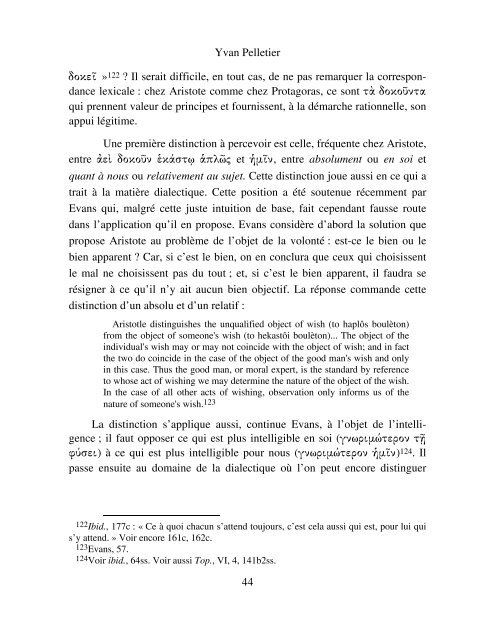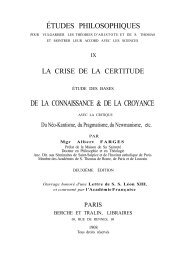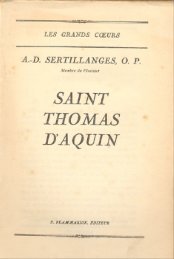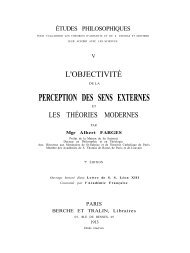- Page 1 and 2: Monographies Philosophia Perennis #
- Page 3 and 4: TABLE DES MATIÈRES Introduction 1
- Page 5 and 6: La dialectique aristotélicienne 3.
- Page 7: Remerciements Je voudrais témoigne
- Page 10 and 11: Yvan Pelletier rigoureux, le matér
- Page 12 and 13: Yvan Pelletier résignation à une
- Page 14 and 15: Yvan Pelletier conception d’Arist
- Page 16 and 17: Yvan Pelletier À quelle réalité
- Page 18 and 19: Yvan Pelletier Topiques et les situ
- Page 20 and 21: Yvan Pelletier d’abord qu’à lu
- Page 22 and 23: Yvan Pelletier simplement le lieu d
- Page 24 and 25: Yvan Pelletier tout à fait aristot
- Page 26 and 27: Yvan Pelletier and he never claimed
- Page 28 and 29: Yvan Pelletier mot adversaire, et c
- Page 30 and 31: Yvan Pelletier qui font facilement
- Page 32 and 33: Yvan Pelletier satisfaire et, à l
- Page 35: Section I
- Page 38 and 39: Yvan Pelletier spontanément l’ac
- Page 40 and 41: Yvan Pelletier tâtonnements, essai
- Page 42 and 43: Yvan Pelletier ce qu’il apprend d
- Page 44 and 45: Yvan Pelletier à Aristote que les
- Page 46 and 47: Yvan Pelletier d’autant plus appr
- Page 48 and 49: Yvan Pelletier Mais peut-on obtenir
- Page 52 and 53: Yvan Pelletier scientifique. Pour p
- Page 54 and 55: Yvan Pelletier n’est-elle pas app
- Page 56 and 57: Yvan Pelletier ce qui tient lieu d
- Page 58 and 59: Yvan Pelletier ce dont précisémen
- Page 60 and 61: Yvan Pelletier discussion avec un i
- Page 62 and 63: Yvan Pelletier La dialectique est d
- Page 64 and 65: Yvan Pelletier Pourtant, dans un te
- Page 66 and 67: Yvan Pelletier 3. Le dialecticien p
- Page 68 and 69: Yvan Pelletier pas de saveur aristo
- Page 70 and 71: Yvan Pelletier Alors, d’où vient
- Page 72 and 73: Yvan Pelletier même qu’il est, n
- Page 74 and 75: Yvan Pelletier quelque chose qui lu
- Page 76 and 77: Yvan Pelletier Sous cet angle, la c
- Page 78 and 79: Yvan Pelletier juge utile de défin
- Page 80 and 81: Yvan Pelletier sité 209. Si cette
- Page 83 and 84: Chapitre I LA DIALECTIQUE Tant que
- Page 85 and 86: La dialectique aristotélicienne to
- Page 87 and 88: La dialectique aristotélicienne La
- Page 89 and 90: La dialectique aristotélicienne po
- Page 91 and 92: La dialectique aristotélicienne Le
- Page 93 and 94: La dialectique aristotélicienne l
- Page 95 and 96: La dialectique aristotélicienne ce
- Page 97 and 98: La dialectique aristotélicienne op
- Page 99 and 100: La dialectique aristotélicienne Co
- Page 101 and 102:
La dialectique aristotélicienne d
- Page 103 and 104:
La dialectique aristotélicienne at
- Page 105 and 106:
La dialectique aristotélicienne qu
- Page 107 and 108:
La dialectique aristotélicienne ti
- Page 109 and 110:
La dialectique aristotélicienne de
- Page 111 and 112:
La dialectique aristotélicienne De
- Page 113 and 114:
La dialectique aristotélicienne da
- Page 115:
La dialectique aristotélicienne 10
- Page 119 and 120:
Chapitre III LE DIALOGUE Platon et
- Page 121 and 122:
La dialectique aristotélicienne di
- Page 123 and 124:
La dialectique aristotélicienne d
- Page 125 and 126:
La dialectique aristotélicienne l
- Page 127 and 128:
La dialectique aristotélicienne me
- Page 129 and 130:
La dialectique aristotélicienne n
- Page 131 and 132:
La dialectique aristotélicienne so
- Page 133 and 134:
La dialectique aristotélicienne ni
- Page 135 and 136:
La dialectique aristotélicienne co
- Page 137 and 138:
La dialectique aristotélicienne fo
- Page 139 and 140:
La dialectique aristotélicienne le
- Page 141 and 142:
La dialectique aristotélicienne ti
- Page 143 and 144:
La dialectique aristotélicienne m
- Page 145 and 146:
La dialectique aristotélicienne re
- Page 147 and 148:
La dialectique aristotélicienne pr
- Page 149 and 150:
La dialectique aristotélicienne so
- Page 151 and 152:
La dialectique aristotélicienne qu
- Page 153 and 154:
Chapitre IV L’ATTAQUE La recherch
- Page 155 and 156:
La dialectique aristotélicienne s
- Page 157 and 158:
La dialectique aristotélicienne 2.
- Page 159 and 160:
La dialectique aristotélicienne te
- Page 161 and 162:
La dialectique aristotélicienne co
- Page 163 and 164:
La dialectique aristotélicienne d
- Page 165 and 166:
La dialectique aristotélicienne de
- Page 167 and 168:
La dialectique aristotélicienne me
- Page 169 and 170:
La dialectique aristotélicienne Ar
- Page 171 and 172:
La dialectique aristotélicienne Qu
- Page 173 and 174:
La dialectique aristotélicienne pe
- Page 175 and 176:
La dialectique aristotélicienne In
- Page 177:
La dialectique aristotélicienne cl
- Page 180 and 181:
Yvan Pelletier Aristote fait du dia
- Page 182 and 183:
Yvan Pelletier à l’épreuve. Tou
- Page 184 and 185:
Yvan Pelletier hommes cherchent ens
- Page 186 and 187:
Yvan Pelletier tement aptes à disp
- Page 188 and 189:
A. L’attaque, œuvre commune Yvan
- Page 190 and 191:
Yvan Pelletier n’est nullement so
- Page 192 and 193:
Yvan Pelletier réfuter — ou comm
- Page 194 and 195:
Yvan Pelletier répondeur sur le de
- Page 196 and 197:
Yvan Pelletier ı », « Û ı » 5
- Page 198 and 199:
Yvan Pelletier tion momentanée du
- Page 200 and 201:
Yvan Pelletier embarrassé et ne s
- Page 202 and 203:
Yvan Pelletier un problème donné,
- Page 204 and 205:
Yvan Pelletier exigeait du réponde
- Page 206 and 207:
Yvan Pelletier xale 533, et l’on
- Page 208 and 209:
Yvan Pelletier investiguée, le dem
- Page 210 and 211:
C. Les demandes et les réponses 54
- Page 212 and 213:
Yvan Pelletier besoin va se représ
- Page 214 and 215:
Yvan Pelletier situation semblable,
- Page 216 and 217:
Yvan Pelletier ces exigences. Et ce
- Page 218 and 219:
Yvan Pelletier demandeur avait fait
- Page 220 and 221:
Yvan Pelletier par exemple, on appa
- Page 222 and 223:
Yvan Pelletier prémisses qui de fa
- Page 224 and 225:
Yvan Pelletier position initiale. I
- Page 226 and 227:
Yvan Pelletier monter quelque induc
- Page 228 and 229:
Yvan Pelletier raisonnement était
- Page 230 and 231:
Yvan Pelletier position, on ne comp
- Page 232 and 233:
Yvan Pelletier attaque contre la po
- Page 234 and 235:
Yvan Pelletier répondeur, de lési
- Page 236 and 237:
Yvan Pelletier l’universelle, le
- Page 238 and 239:
Yvan Pelletier trop peu endoxales o
- Page 240 and 241:
Yvan Pelletier font ainsi les diffi
- Page 242 and 243:
Yvan Pelletier possible la situatio
- Page 244 and 245:
1. L’enseignement Yvan Pelletier
- Page 246 and 247:
Yvan Pelletier pas question d’env
- Page 248 and 249:
Yvan Pelletier rance consciente à
- Page 250 and 251:
Yvan Pelletier à ce qui a un air d
- Page 252 and 253:
Yvan Pelletier dsv rsv dsa rsa die
- Page 254 and 255:
Yvan Pelletier même, que la mauvai
- Page 256 and 257:
Yvan Pelletier trop lourds et déj
- Page 258 and 259:
Yvan Pelletier très bien de tout c
- Page 260 and 261:
Yvan Pelletier grer à un raisonnem
- Page 262 and 263:
Yvan Pelletier encore une fois pour
- Page 264 and 265:
Yvan Pelletier On voit généraleme
- Page 266 and 267:
Yvan Pelletier jeu. Il leur est cla
- Page 268 and 269:
Yvan Pelletier mesure où il réuss
- Page 270 and 271:
Yvan Pelletier de la nourriture qu
- Page 272 and 273:
Yvan Pelletier manière dialectique
- Page 274 and 275:
Yvan Pelletier nécessite que chacu
- Page 276 and 277:
Yvan Pelletier réagira l’éprouv
- Page 278 and 279:
Yvan Pelletier tellement toujours p
- Page 280 and 281:
Yvan Pelletier répondeur qui ne pr
- Page 282 and 283:
Yvan Pelletier comment la dissimula
- Page 284 and 285:
Yvan Pelletier ment progressé dans
- Page 286 and 287:
Yvan Pelletier piéger, il était p
- Page 288 and 289:
Yvan Pelletier universelle, mais su
- Page 291:
Section III
- Page 294 and 295:
Yvan Pelletier nécessité distinct
- Page 296 and 297:
Yvan Pelletier comme première et d
- Page 298 and 299:
Yvan Pelletier réclamer. Ainsi, to
- Page 300 and 301:
Yvan Pelletier l’esprit le dialec
- Page 302 and 303:
Yvan Pelletier propos des Topiques
- Page 304 and 305:
Yvan Pelletier D’abord, le but de
- Page 306 and 307:
Yvan Pelletier explicitement aux To
- Page 308 and 309:
Yvan Pelletier rien. Aristote, en e
- Page 310 and 311:
Yvan Pelletier Il en résulte manif
- Page 312 and 313:
Yvan Pelletier L’opposition radic
- Page 314 and 315:
Yvan Pelletier nécessairement une
- Page 316 and 317:
Yvan Pelletier peuvent être identi
- Page 318 and 319:
Yvan Pelletier éloigné ou abstrai
- Page 320 and 321:
Yvan Pelletier que le dialecticien
- Page 322 and 323:
Yvan Pelletier Après la remarque d
- Page 324 and 325:
Yvan Pelletier agressives à l’é
- Page 326 and 327:
Yvan Pelletier relation de contrair
- Page 328 and 329:
Yvan Pelletier est attribué univer
- Page 330 and 331:
Yvan Pelletier uniquement parce qu
- Page 332 and 333:
Yvan Pelletier Le terme ı peut sig
- Page 334 and 335:
Yvan Pelletier accessibles, quand o
- Page 336 and 337:
Yvan Pelletier Tous les lieux ne jo
- Page 338 and 339:
Yvan Pelletier tout à fait extéri
- Page 340 and 341:
Yvan Pelletier celle du lieu, assis
- Page 342 and 343:
Yvan Pelletier tion du genre avec l
- Page 344 and 345:
Yvan Pelletier Parler ainsi du lieu
- Page 346 and 347:
Yvan Pelletier l’ “espèce”.
- Page 348 and 349:
Yvan Pelletier verselles. À son av
- Page 350 and 351:
Yvan Pelletier vrai dans ces raison
- Page 352 and 353:
Yvan Pelletier même [sujet] est su
- Page 354 and 355:
Yvan Pelletier lieu est commun aux
- Page 356 and 357:
Yvan Pelletier sujet 981. C’est
- Page 359 and 360:
Chapitre VIII L’ESPECE Le lieu ha
- Page 361 and 362:
La dialectique aristotélicienne gr
- Page 363 and 364:
La dialectique aristotélicienne qu
- Page 365 and 366:
La dialectique aristotélicienne pr
- Page 367 and 368:
La dialectique aristotélicienne en
- Page 369 and 370:
La dialectique aristotélicienne pr
- Page 371 and 372:
La dialectique aristotélicienne pa
- Page 373 and 374:
La dialectique aristotélicienne d
- Page 375 and 376:
La dialectique aristotélicienne po
- Page 377 and 378:
Chapitre IX L’INSTRUMENT Aristote
- Page 379 and 380:
La dialectique aristotélicienne qu
- Page 381 and 382:
La dialectique aristotélicienne Au
- Page 383 and 384:
La dialectique aristotélicienne in
- Page 385 and 386:
La dialectique aristotélicienne po
- Page 387 and 388:
La dialectique aristotélicienne B.
- Page 389 and 390:
La dialectique aristotélicienne Tr
- Page 391 and 392:
La dialectique aristotélicienne se
- Page 393 and 394:
La dialectique aristotélicienne de
- Page 395 and 396:
La dialectique aristotélicienne mi
- Page 397 and 398:
Chapitre X LE GENRE Examiner succes
- Page 399 and 400:
La dialectique aristotélicienne qu
- Page 401 and 402:
La dialectique aristotélicienne et
- Page 403 and 404:
La dialectique aristotélicienne d
- Page 405 and 406:
La dialectique aristotélicienne de
- Page 407 and 408:
La dialectique aristotélicienne r
- Page 409 and 410:
La dialectique aristotélicienne ,
- Page 411 and 412:
La dialectique aristotélicienne qu
- Page 413 and 414:
4. Les problèmes rationnels La dia
- Page 415 and 416:
La dialectique aristotélicienne au
- Page 417 and 418:
La dialectique aristotélicienne d
- Page 419 and 420:
La dialectique aristotélicienne ti
- Page 421 and 422:
La dialectique aristotélicienne lo
- Page 423 and 424:
La dialectique aristotélicienne ce
- Page 425 and 426:
La dialectique aristotélicienne D
- Page 427 and 428:
La dialectique aristotélicienne re
- Page 429 and 430:
CONCLUSION Il ne m’est plus possi
- Page 431 and 432:
La dialectique aristotélicienne l
- Page 433 and 434:
La dialectique aristotélicienne di
- Page 435 and 436:
La dialectique aristotélicienne co
- Page 437 and 438:
La dialectique aristotélicienne Il
- Page 439 and 440:
LIEUX DE L'ACCIDENT LIEUX DES AUTRE
- Page 441:
La dialectique aristotélicienne Un
- Page 444 and 445:
Yvan Pelletier _______ «Topics.»
- Page 446 and 447:
Yvan Pelletier Soto, Dominici. In P
- Page 448 and 449:
Yvan Pelletier Reneccius, Jacobus.
- Page 450 and 451:
Yvan Pelletier *Hambruch, Ernst. Lo
- Page 452 and 453:
Yvan Pelletier Walton, Douglas. Top
- Page 454 and 455:
Yvan Pelletier *_______________ The
- Page 456 and 457:
Yvan Pelletier Kwiatrowski, Tadeuzs
- Page 458 and 459:
Yvan Pelletier ___________ Logica e
- Page 460 and 461:
Yvan Pelletier *________ De Anima .
- Page 462 and 463:
Yvan Pelletier *Gredt, Joseph. Elem
- Page 464 and 465:
Yvan Pelletier *Stocks, J.L. «The
- Page 467 and 468:
LE VOCABULAIRE DIALECTIQUE DES Topi
- Page 469 and 470:
La dialectique aristotélicienne Û
- Page 471 and 472:
La dialectique aristotélicienne Ô
- Page 473 and 474:
La dialectique aristotélicienne 2a
- Page 475 and 476:
La dialectique aristotélicienne Û
- Page 477 and 478:
La dialectique aristotélicienne Û






